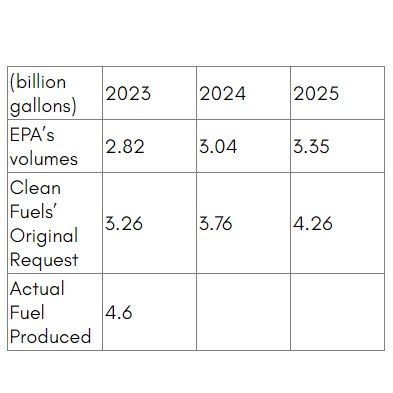Clean Fuels Alliance America petitions EPA to reconsider 2024 and 2025 RFS volumes

SOURCE: Clean Fuels Alliance America
June 25, 2024
BY Clean Fuels Alliance America
Today, Clean Fuels Alliance America filed a formal petition asking the U.S. EPA to reconsider Renewable Fuel Standard volumes for 2024 and 2025. The agency set biomass-based diesel and overall advanced volumes significantly below actual production of the fuels, ignoring available data on the rapid build out of production capacity. The low volumes are discouraging production, sacrificing greenhouse gas emission reductions, and undercutting the economic benefits intended under the program.
“As the agency set the RFS rule last year, Clean Fuels asked EPA to support achievable growth in biomass-based diesel of 500 million gallons a year. That request was very conservative, since the industry’s achieved growth of 4.6 billion gallons is significantly higher,” said Kurt Kovarik, vice president of federal affairs for Clean Fuels Alliance America. “We warned EPA that the ‘no growth’ rule they set would undercut investments, economic opportunities for our industry and environmental benefits. Unfortunately, we’re seeing those consequences now.”
Advertisement
Kovarik continued, “Clean Fuels is asking EPA to use the industry’s demonstrated production in 2023 as a baseline and allow additional growth in 2024 and 2025. Clean Fuels believes that EPA should set the biomass-based diesel volume for 2024 at 5.1 billion gallons and for 2025 at 5.6 billion gallons, with proportional increases for the overall advanced and overall renewable fuel volumes.”
Clean Fuels’ petition highlights data available to EPA at the time the RFS rule was finalized that signaled aggressive growth in available volumes of biomass-based diesel:
Advertisement
- Data from EPA’s Moderated Transaction System (EMTS) shows that qualifying biomass-based diesel production increased by more than 30% — or 400 million gallons – in the first five months of 2023, compared to the same period in 2022.
- The U.S. Energy Information Administration’s (EIA) Short Term Energy Outlook (STEO) for June 2023 projected increases in U.S. production of biodiesel and renewable diesel of more than 800 million gallons in 2023 and 900 million gallons in 2024.
- Companies made significant investments in new production capacity prior to the set rule. Those companies have followed through to bring planned capacity online.
- U.S. companies made significant investments in new oilseed processing capacity prior to the set rule. Profit margins for processing and prices for all fats and oils across the board have dropped, due to the lack of demand drivers.
- USDA Foreign Ag Service data showed values for imported fats and oils doubled from 2021 to 2023, prior to the set rule. Yet EPA discounted availability of imported feedstocks that would support the industry’s growth.
Clean Fuels’ petition further highlights the negative impacts that will continue to materialize if EPA does not revise the 2024 and 2025 volumes. Due to the squeeze on available market space for advanced biofuels:
- 116 million gallons of annual biodiesel production capacity has idled and 12 million gallons has permanently closed.
- Approximately 1.4 billion gallons per year of planned renewable diesel capacity has been delayed. Nearly 350 million gallons of announced capacity has been reduced or canceled.
- Approximately 800 million gallons of planned SAF production has been delayed.
- Combined, biodiesel and renewable diesel production is running about 1.28 billion gallons below existing capacity. This difference equates to an opportunity cost of 40,768 jobs and almost $14 billion in economic activity.
- If the RVO was aligned with today’s production capacity, the United States could avoid an additional 11 million metric tons of CO2e relative to today’s actual production volumes.
The petition is available on CleanFuels.org.
Related Stories
The U.S. EPA on July 8 hosted virtual public hearing to gather input on the agency’s recently released proposed rule to set 2026 and 2027 RFS RVOs. Members of the biofuel industry were among those to offer testimony during the event.
The USDA’s Risk Management Agency is implementing multiple changes to the Camelina pilot insurance program for the 2026 and succeeding crop years. The changes will expand coverage options and provide greater flexibility for producers.
President Trump on July 4 signed the “One Big Beautiful Bill Act.” The legislation extends and updates the 45Z credit and revives a tax credit benefiting small biodiesel producers but repeals several other bioenergy-related tax incentives.
CARB on June 27 announced amendments to the state’s LCFS regulations will take effect beginning on July 1. The amended regulations were approved by the agency in November 2024, but implementation was delayed due to regulatory clarity issues.
SAF Magazine and the Commercial Aviation Alternative Fuels Initiative announced the preliminary agenda for the North American SAF Conference and Expo, being held Sept. 22-24 at the Minneapolis Convention Center in Minneapolis, Minnesota.
Upcoming Events










